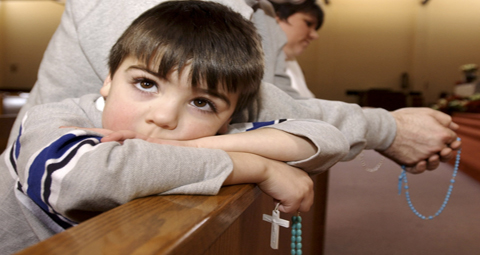May 9 | ![]() 0 COMMENTS
0 COMMENTS ![]() print
print

Boldness with God can be a sign of a mature relationship
— Fr Ron Rolhesier
Some years ago, a woman shared this story at a workshop. She had a six year-old son whom she had conscientiously schooled in prayer. Among other things, she made him kneel beside his bed every night and say aloud a number of prayers, ending with an invocation to ‘bless mummy, daddy, grandma, and grandpa.’
One night, shortly after he had started school, she took him to his room to hear his prayers and to tuck him in for the night. But when it came time for him to kneel by his bedside and recite his prayers, he refused and crawled into bed instead. His mother asked him: “What’s the matter? Don’t you pray anymore?” There was remarkable calm in his reply: “No,” he said, “I don’t pray anymore. The sister teaching us at school told us that we are not supposed to pray, she said that we are supposed to talk to God … and tonight I am tired and have nothing to say!”
This is reminiscent of a scriptural story about King David. One morning, returning from battle with some of his soldiers, he arrived at the temple, tired and hungry, but the only food available consisted of consecrated loaves of bread in the temple, which by Jewish religious law, were to be eaten only by the priests in sacred ritual. David asked the high priest for the loaves and was met by the objection that these loaves were not to be eaten as ordinary food. David replied that he was aware of that, but, given the situation and given that as King he was empowered to make decisions for God on earth, he ordered the priest to give him the loaves.
Biblical tradition commends David for that. He is praised for doing a good thing, for knowing God well enough to know that God would want that bread to be used for exceptional purposes in that situation. He is praised for having a mature faith, for not being unduly legalistic, for not abdicating sound judgment because of fear and piety, and for knowing God well enough to know that God is not a law to be obeyed but rather a loving presence that counsels us and imbues us with life and energy.
Jesus, too, praises David for this action when His own disciples are chastised for shelling corn on the Sabbath. He refers to David’s action of feeding his hungry soldiers with the consecrated loaves as an act of deeper understanding, that is, in doing this seemingly sacrilegious act, David was in fact demonstrating an intimacy with God that his critics, because of fear, betrayed themselves as lacking.
One of the things that characterises mature friendship is a familiarity and intimacy that makes for a robust relationship rather than a fearful one. In a mature relationship there is no place for fearful piety or false reverence. Rather with a close friend we are bold because we know the other’s mind, fully trust the other, and are at a level of relationship where we are unafraid to ask for things, can be shamelessly self-disclosing, are given to playfulness and teasing, and are (like King David) able to responsibly interpret the other’s mind.
When we are in a mature relationship with someone we are comfortable and at ease with that person.
That is also one of the qualities of a mature faith and a mature relationship with God. According to John of the Cross, the deeper we move into a relationship with God and the more mature our faith becomes, the more bold we will become with God. Like King David and like the young boy just described, fearful piety will be replaced by a healthy familiarity.
And this will not be the kind of familiarity that breeds contempt; that takes the other for granted. Rather it will be the kind of familiarity that is grounded in intimacy which, while remaining respectful and never taking the other for granted, is more at ease and playful than fearful and pious in that other’s presence.
But, if that is true, then what are we to make of the fact that scripture tells us ‘the fear of God is the beginning of wisdom’ and the fact that religious tradition has always deemed piety a virtue? Do fear and piety militate against ‘boldness’ with God? Was King David wrong in his bold interpretation of God’s Will.
There is a religious fear that is healthy and there is a piety that is healthy, but neither of these is exhibited in a relationship that is fearful, legalistic, scrupulous, over-pious, or over-serious. Healthy religious fear and healthy piety manifest themselves in a relationship that is robust.
We should not let ourselves be fooled by fear and piety. Fear easily masks itself as religious reverence. Piety can easily pass itself off as religious depth. But genuine intimacy unmasks both. A healthy relationship is robust, bold, and is characterised by lack of fear, ease, playfulness, and humour. And that is particularly true of our relationship with God.
n Fr Ronald Rolheiser, a Catholic priest and member of the Missionary Oblates of Mary Immaculate, is president of the Oblate School of Theology in San Antonio, Texas











